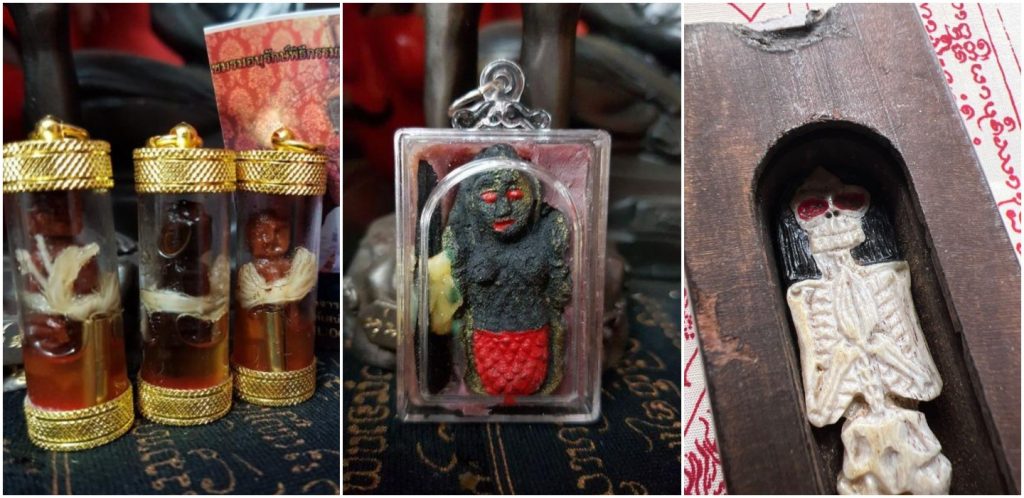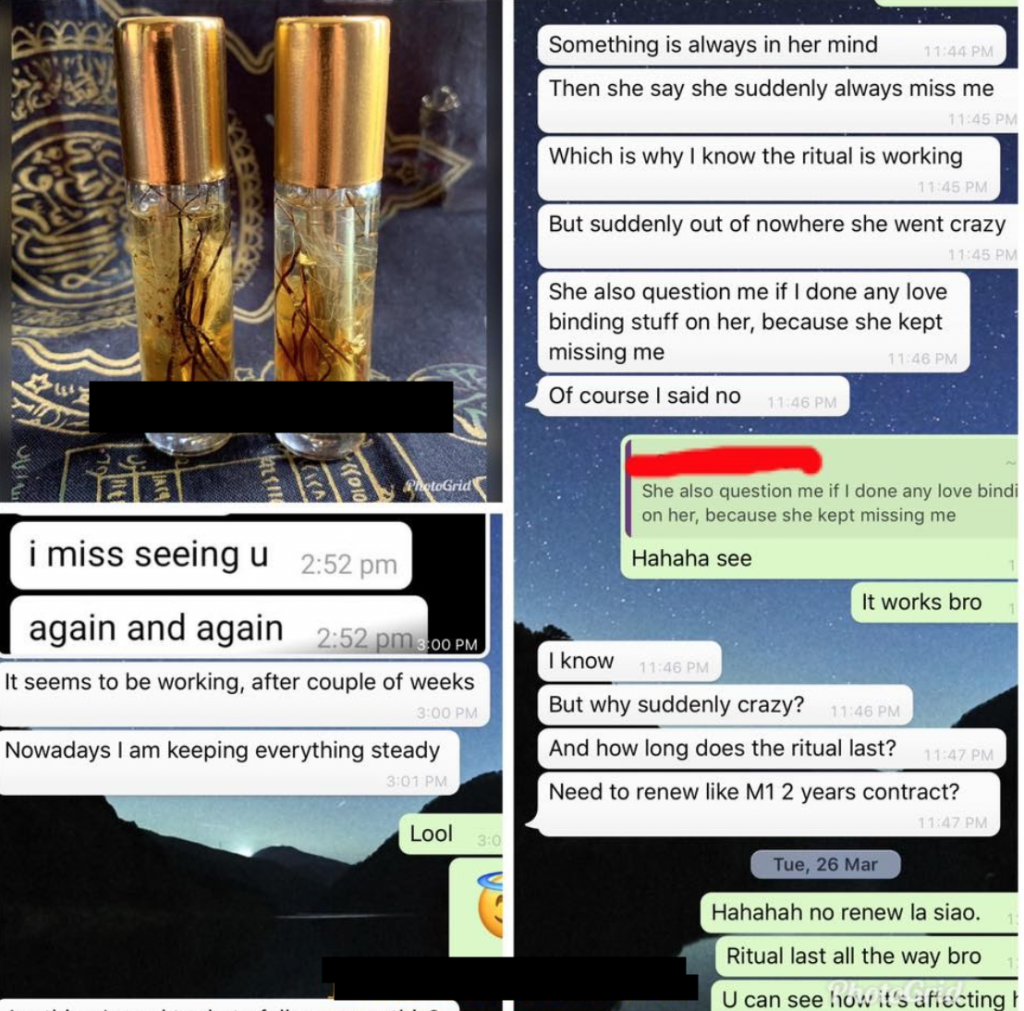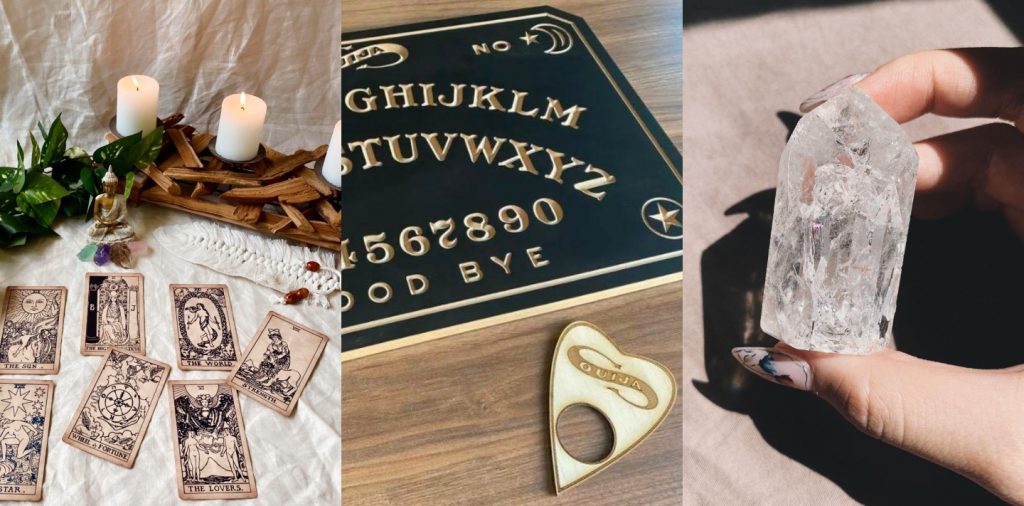Top Image: Screengrabs from Carousell
Scrolling through popular online marketplace Carousell, I stumble upon a listing that catches my eye. A small bottle filled with blood-red oil, in which a few strands of an inconspicuous root float around. It’s an ‘attraction oil’ according to the seller.
The $170 product is made of Bulu Perindu, the listing explains, a root that “has always been the number 1 choice for ‘bomohs’ when it comes to creating love charms and attraction oils.” When applied to key points of the face, this oil can allegedly make a person appear more charismatic, attractive, and sexually appealing.
ADVERTISEMENT
I leave the listing and continue exploring related items and stumble upon a skeleton amulet “known to bestow the owner with [a] sixth sense,” a ouija board, various spiritual healing services, more attraction cocktails, a wealth fetching spider, and occult amulets.
What I see is a testament to the shift towards e-commerce we have seen over the past decade, which has brought many industries into a new digital age—including the spiritual and occult ones.

“Everything in the world has now transitioned to e-commerce,” said 36-year-old Abang Zack, who runs digital occult store pusaka.sg, where he provides spiritual healing services. “I’ve been in this trade for about seven years, and Carousell has provided the best platform on which to advertise my services and products.”
His most popular items include stone rings, love reconciliation rituals, and spiritual healing services. His items and services are conducted and sold in accordance with the practices of his trusted “guru” in Indonesia.
“Beyond Singapore, I have clients from as far as the USA and the Netherlands, from 16 years old to 70 plus-year-old men and women.”
For most young entrepreneurs in the spiritual and occult industry, starting businesses online and on platforms like Carousell is the only option. “Having a physical store is not viable for me due to high overheads,” Zack explained.
Similarly, Noi, an online Thai amulet store seller in his late 20s who asked to remain anonymous, told me that he has been passionate about the occult since young. But because of financial difficulties he faced in his early twenties, he was never able to open a physical store.
Over time, he sourced amulets from reputable sellers in Thailand and online. Eventually, he managed to garner a collection substantial enough to open his small online store.
“When I first started, my family was really opposed to the idea of it, thinking that it’s evil. Of course, the movies and horror stories didn’t help.”

An Environment Ripe For Scams
While online platforms help young occult professionals kickstart their careers, the industry remains largely unregulated and vulnerable to scams.
ADVERTISEMENT
In 2017, police arrested a man for charging a woman $52,250 to conduct prayers he claimed would remove a black magic spell cast on her. Once the woman made the payment, he became uncontactable. On a smaller scale, the online space has experienced scams as well. Last year, a popular occult store made a post claiming that another seller had stolen their item descriptions on Carousell to sell inauthentic items on the platform.
Noi told me that he too has noticed scammers on Carousell and that he can usually pick them out by the way they promise results to their customers. “I’ve seen multiple sellers promise 100% success for their rituals, or results in X amount of days—which is just unrealistic. And when their promised results don’t materialise, they go MIA.”
“I only started offering Thai rituals last year. I told myself that if I wanted to offer a service like this, I would make sure everything is done properly, that the odds of success are good, and that everything is explained clearly to the customer.”
While there are possible indicators to help point out a scam, Noi emphasises that on the flip side, individuals should not blame sellers for being frauds just because they didn’t get the results they had hoped for.
“It’s like going to a temple and praying for good luck. If it doesn’t happen, it doesn’t mean the temple is a hoax.”
Forget scam or no scam. What about right and wrong?
Beyond the scams that exist in the industry, others are more concerned with the morality of occult specialists found online.
Ustaz Ruknuddin, a 33-year old ruqyah practitioner in his company Khidmaat Al-Arkaan, told me that love potions like the one I found are considered part of black magic, and Islam bans Muslims from indulging in black magic.
“These go against the teachings of Islam,” he explained. “With any ring, object, or necklace that you need to keep, there is the risk that they have been blessed with mantras or chants from types of black magic, and therefore there is a possibility that there are unseen beings; known as khodam or Jinn, attached to it. And yes, there’s ignorance, and many people don’t know that black magic is wrong. But there are some who know it is wrong but are desperate for fast results.”
Because some Muslims may not know which practices are allowed by Islam and which not, Ustaz Ruknuddin explained that some bomohs or shamans sugarcoat their rituals or spells with verses from the Quran to appear in line with Islamic teachings. “But their practice is still wrong,” he stated.
Ustaz Ruknuddin explained that Muslims should only seek treatment by ruqyah practitioners who use verses from the Quran & Sunnah (prophetic traditions) for healing, as their help should come from Allah alone. Any practitioners who tap into beings from different dimensions or who use chants or spells that were not taught by the prophet are not allowed.
“I thought these practices were most common in older generations, but I realised I was wrong when a guy my age came to me for help,” Ustaz Ruknuddin recalled. “He was in his early thirties, and he told me he had been to a female shaman without knowing whether it was right or wrong. After his visit with her, he was really disturbed. So he came for healing.”
Zack, however, has a different definition of what is considered black magic. “It depends on your intention,” he states. “If it is used to harm other people or attract their spouses, then it becomes evil.”
“Even the white can become black when it is used for evil purposes.”
Similarly, Noi said there are similar conversations in the Thai Buddhist community regarding what is acceptable, what is a cultural practice, and what is religious.
“Thai’s generally believe in ghosts, with many practising daily offerings to spirit houses or keeping spirits in objects,” he explained. “Some say it’s a cultural belief, but for those who keep or believe in spirits, a lot of it is linked to Thai Buddhism.”
“Shops can sell Buddhist and spiritual amulets, while some temples also make spiritual amulets. Buddhism and amulet culture evolved a lot over the years, and what is considered acceptable has changed a lot too.”
Noi believes that there is a lot of misinformation about amulet and occult culture, which scares individuals unnecessarily. He echoed what Zack said about it coming down to the intention of a person: “It’s like asking whether a gun is good or bad. It depends on how it is used. If a spirit is asked to do good, then all is good. If a spirit is asked to do evil things, that’s when it’s wrong.”
“A person who prays to Buddha every day doesn’t automatically make them a good person. On the other hand, keeping spirits isn’t going to automatically make someone a bad person either.”

Can, and should, the industry be regulated?
Speaking to the young sellers on Carousell, it was clear that having an online platform is their only possibility of doing what they are passionate about, especially given the tumultuous past years.
Kelvin, a seller of prayer fragrances and oils on Carousell, said he only started three weeks ago. “I just wanted to try something I like, and if God permits, it will be successful,” he shared. In a time when we are transitioning in and out of strict social distancing regulations, he doubts he would have been able to start his business if it were offline.
Similarly, AsiaOne featured the story of Bambi, an English tuition teacher that made a career switch after offering tarot card reading services on Carousell. She said that move helped her find her calling, as it allowed her to expand her online business to provide reiki and chakra healing services.
So while sellers like Bambi and Kelvin rely on open and accessible online platforms to run their businesses, there is still the impending risk of scams in the industry and the religious concerns of the likes of Ustaz Ruknuddin. But is finding a middle ground even possible? How do you make laws and regulations for an industry that operates outside of the tangible and visible?
So far, Brunei is one of the only countries to have set legal boundaries with laws regarding black magic. In the tiny nation, practising black magic is punishable by fines and jail time. There are hotlines for citizens to report suspicious activities, often leading to arrests. Being a bomoh is also considered a sin, with multiple getting arrested every year.
While Brunei was able to implement strict laws around black magic—primarily due to the implementation of Sharia law—it is unlikely that the same would be possible in Singapore, especially considering how multiple ethnicities and religions practise black magic. There is also the issue that black magic is hard to define—for some, it comes down to the intent. For others, it’s as broad as any spiritual service conducted outside of the boundaries of a specific religion.
Whether the market for the occult becomes regulated by the law or companies like Carousell itself, there is no denying that the online space has brought the entire industry closer to young generations. When once you had to find a bomoh or tarot card reader in a physical realm, you can now shop for their services while buying yourself a preloved handbag.
And when I asked Ustaz Ruknuddin if this increasing accessibility concerned him, he surprisingly said no.
“I am not worried. At the end of the day, there will be consequences. Maybe it’s a journey some individuals need to go through to learn what is right and wrong.”







